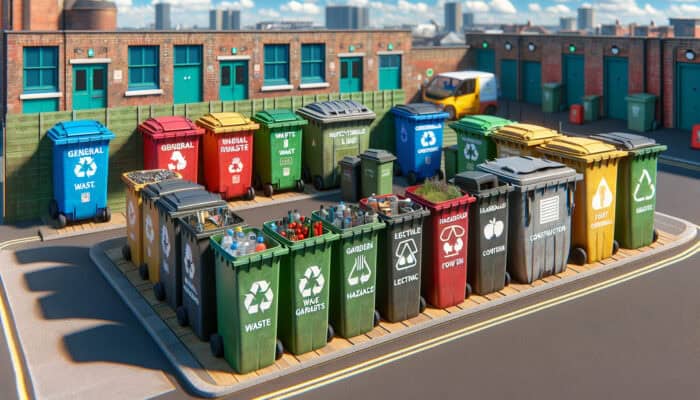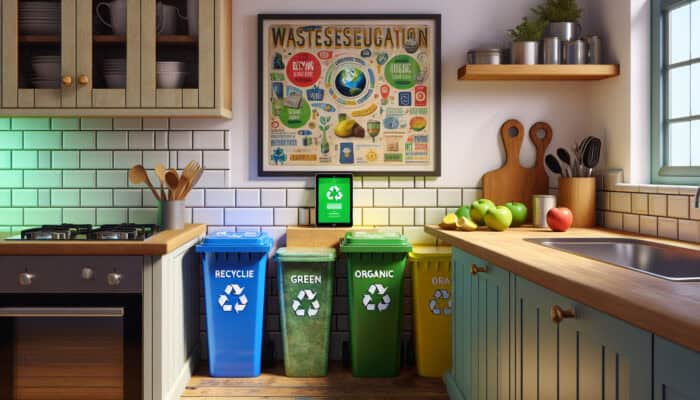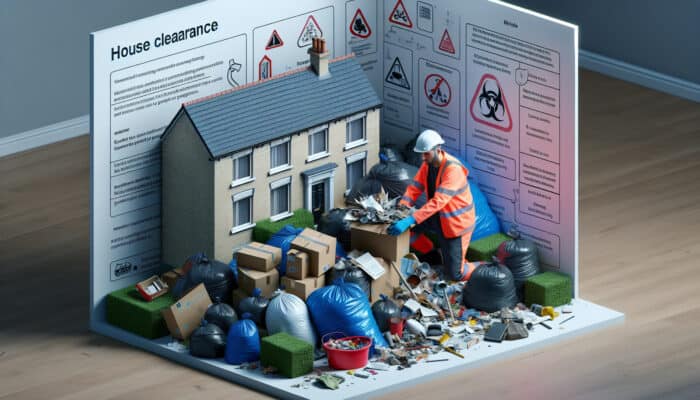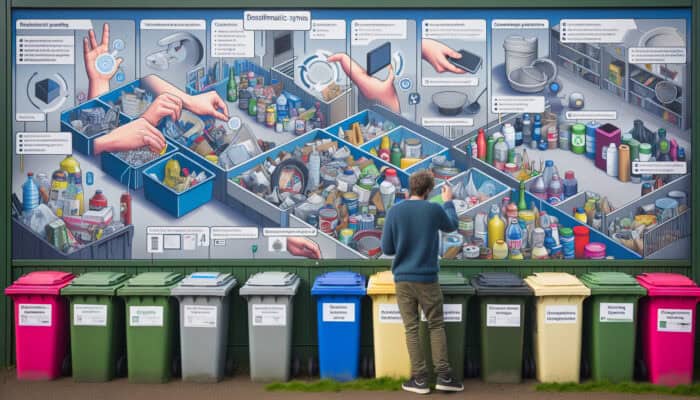Ultimate Guide to Efficient Waste Segregation Practices Across the UK
Understanding the Concept of Waste Segregation

Waste segregation is a critical practice involving the classification of waste into distinct categories, which facilitates effective recycling and disposal methods. This essential strategy is vital for enhancing environmental sustainability and streamlining waste management operations throughout the UK. The primary waste categories individuals should prioritize include:
- General waste
- Recyclables, which encompass paper, plastics, metals, and glass
- Garden waste
- Hazardous waste, including batteries and chemicals
- Electronic waste
- Construction and demolition waste
- Food waste
By meticulously segregating waste, individuals can guarantee that materials undergo proper processing, which minimizes contamination and maximizes recovery rates, ultimately cultivating a cleaner and more sustainable environment.
The Importance of Waste Segregation in the UK
Adopting effective waste segregation practices is paramount for reducing the amount of refuse sent to landfills, enhancing recycling efforts, and ensuring compliance with environmental regulations. Recognizing the importance of this practice can significantly motivate households to adopt more sustainable habits. The benefits of waste segregation are extensive:
- Reduction in landfill usage
- Increased recycling rates
- Lower greenhouse gas emissions
- Conservation of natural resources
- Enhanced community responsibility and environmental awareness
The more households actively engage in waste segregation, the more substantial the positive effects on both the environment and society at large.
Legal Framework Governing Waste Segregation in the UK
The UK has instituted a comprehensive set of laws and regulations surrounding waste management, which includes stipulations for effective waste segregation practices. Being knowledgeable about these legal responsibilities is crucial for households to avoid potential fines. Key legal requirements consist of:
- Adherence to local council waste disposal regulations
- Accurate classification of hazardous waste
- Compliance with the Waste (England and Wales) Regulations
- Ensuring the proper separation of recyclable materials
- Engagement in local recycling programs
By becoming informed and compliant with these legal mandates, residents can contribute meaningfully to the national waste management efforts in the UK.
Proven Strategies for Effective Waste Segregation During House Clearance

Implementing Best Practices for Household Waste Segregation
To successfully implement best practices for waste segregation, it is essential to establish a structured approach within your home. Utilizing clearly defined bins designated for various waste types is of utmost importance. For instance, consider installing color-coded bins that correspond with local recycling guidelines; this simple visual cue helps family members easily identify where to dispose of each item. Educating all household members about the significance of waste segregation and providing straightforward, clear instructions can significantly enhance participation.
Real-life examples from households throughout the UK showcase the effectiveness of proper waste segregation: many families designate specific areas in their kitchens for recycling, composting, and general waste, simplifying the initial separation of items. For example, placing a compact compost bin under the sink encourages responsible disposal of vegetable peelings and food scraps, which effectively reduces overall general waste. Regularly reviewing local recycling guidelines ensures that households stay informed about what materials can and cannot be recycled, as these rules may change annually.
Steps to Implement Effective Waste Segregation at Home
Establishing a successful waste segregation system at home requires thoughtful planning and commitment from all family members. Start by assessing the available space and selecting suitable bins or containers for each waste category. Clearly label each bin to eliminate confusion and ensure that everyone comprehends its intended use.
Actionable steps to create an efficient waste segregation system include:
1. Designating specific locations for waste bins, such as in the kitchen, garage, or garden.
2. Providing educational materials that clarify what can and cannot be recycled.
3. Involving family members by assigning specific roles or responsibilities for waste management.
4. Regularly checking and emptying bins to prevent overflow and contamination.
Creating an effective system should be simple to maintain, empowering household members to engage in sustainable practices.
Essential Tools and Resources for Effective Waste Segregation

A wide array of tools and resources are available to facilitate effective waste segregation in UK households. While recycling bins are fundamental, families can also take advantage of composters designed for organic waste and other tools that assist in efficient sorting. Many local councils offer subsidised bins or provide informative guides on recycling practices.
Expert analysis suggests that leveraging local council resources, including websites and hotlines, can deliver up-to-date guidance on waste segregation and disposal. Community initiatives frequently organize workshops to educate residents about proper segregation techniques and the importance of recycling. Additionally, various applications and online platforms offer recycling tips and information on nearby disposal locations, ensuring that households remain proactive in their waste management efforts.
Environmental Impact of Effective Waste Segregation
The environmental benefits of waste segregation are profound and multifaceted. By effectively separating waste, households contribute significantly to a reduction in landfill mass—a major source of methane gas that is harmful to the atmosphere. Furthermore, waste segregation facilitates the recycling of materials, conserving natural resources and energy while decreasing the necessity for new production processes.
Proper waste segregation results in lower greenhouse gas emissions because recyclable materials are processed instead of sent to landfills. This practice not only mitigates climate change but also supports a circular economy where materials are reused rather than discarded. The cumulative effect of individual efforts leads to a healthier environment for everyone, significantly enhancing the quality of life across the UK.
Addressing Common Challenges in Waste Segregation and Solutions
Households often face several challenges related to waste segregation, which can hinder effective practices. A prevalent issue in smaller homes is a lack of space for multiple bins, leading to confusion about where to dispose of different types of waste. Additionally, residents may be uncertain about local recycling regulations, resulting in contamination of recyclable materials.
To overcome these challenges, consider implementing the following solutions:
1. Space-Saving Solutions: Use stackable bins or multi-compartment containers to maximize available space.
2. Clear Communication: Provide simple, easy-to-understand guidelines regarding what can and cannot be recycled.
3. Family Engagement: Encourage family members to participate in waste segregation by transforming it into an enjoyable activity, such as a game to see who can recycle the most items correctly.
By proactively addressing these common challenges, households can develop a more efficient waste segregation system.
Effective Strategies for Sorting Various Waste Types in the UK
Identifying Different Types of Waste for Separation
In the UK, effective waste management starts with recognizing the various types of waste that require separation. The primary categories include:
– General waste: This includes items that cannot be recycled or composted and should be disposed of in the general waste bin.
– Recyclables: Items like paper, plastics, glass, and metals that can be processed and reused.
– Garden waste: Organic materials from gardens, including cuttings, leaves, and branches, should be composted or taken to dedicated collection points.
– Hazardous waste: Materials like batteries, chemicals, and certain electronic waste require special disposal methods to prevent environmental harm.
Each waste type has specific disposal methods, which can differ by locality. For instance, recyclable materials may be collected curbside, while hazardous waste typically necessitates transportation to designated facilities, ensuring safe and efficient management.
Recognizing Recyclable Materials in the UK
Identifying recyclable materials in the UK involves understanding local recycling symbols and guidelines. Common recyclable materials include:
– Paper and cardboard: Ensure items are clean and dry, free from food residues.
– Plastics: Look for the recycling symbol; most local councils accept specific types of plastic, such as PET and HDPE.
– Glass: Clear, green, and brown glass bottles and jars are typically accepted, provided they are rinsed clean.
– Metals: Empty food tins and drink cans can be recycled but must be free from contamination.
Staying informed about local recycling guidelines is essential, as these can change frequently. Checking your local council’s website for specific recycling rules and participating in community workshops can provide valuable insights into which materials are accepted and how they should be prepared for recycling.
Handling Hazardous Waste Properly in the UK
Hazardous waste requires careful handling and disposal to protect public health and the environment. In the UK, items such as batteries, chemicals, and certain electronic goods must not be discarded in general waste bins. Instead, residents should utilize designated facilities for responsible disposal.
To locate these facilities, you can:
– Check your local council’s website for hazardous waste disposal locations and guidelines.
– Look for community recycling events that offer hazardous waste drop-off options.
– Contact local environmental agencies for information on safe disposal practices.
By ensuring hazardous waste is disposed of properly, residents can help mitigate potential environmental harm and maintain public safety.
Key Benefits of Proper Waste Segregation in the UK
Environmental Benefits of Effective Waste Segregation
Proper waste segregation significantly contributes to environmental health in the UK. Reducing the volume of waste directed to landfills decreases the greenhouse gas emissions associated with waste decomposition. Benefits also include the conservation of natural resources through recycling, which saves energy and lessens the demand for new raw materials.
Moreover, effective waste segregation promotes biodiversity and protects ecosystems by diverting harmful materials from landfills and ensuring their proper treatment. By fostering a culture of recycling and responsible waste management, households play a crucial role in creating a healthier environment for future generations.
Economic Advantages Linked to Waste Segregation
The economic benefits of waste segregation are considerable for both households and the broader UK economy. By reducing the volume of waste sent to landfills, households can lower disposal costs, which may be reflected in reduced waste management fees charged by local councils.
Furthermore, effective waste segregation supports the growth of the recycling industry, creating jobs and stimulating economic activity. As consumer demand for recycled materials rises, businesses benefit from decreased costs associated with raw material procurement, resulting in a more sustainable economic model. Hence, waste segregation not only encourages environmental responsibility but also strengthens the UK economy.
Social Benefits of Implementing Waste Segregation
Waste segregation carries significant social implications, enhancing community cleanliness and fostering a sense of environmental responsibility among residents. Improved waste management practices lead to cleaner streets and public spaces, contributing to overall public health and well-being.
Moreover, as communities adopt sustainable waste practices, they cultivate a culture of environmental awareness and responsibility. Participating in local recycling and waste management initiatives fosters community bonding and promotes social cohesion, as residents work together towards a shared objective: creating a cleaner and greener environment in the UK.
Effective Strategies for Waste Segregation During House Clearance
Educating Your Family on Waste Segregation
Educating family members about the importance of waste segregation is crucial for ensuring effective participation in waste management. Begin by discussing why segregation is essential and the benefits it provides for both the environment and the community. Demonstrating proper sorting techniques will help family members understand how to accurately separate waste.
Effective educational strategies include:
1. Visual aids: Create vibrant charts or posters that illustrate what belongs in each bin.
2. Interactive learning: Involve family members in sorting activities, making it an engaging task.
3. Regular discussions: Hold family meetings to discuss any challenges faced in waste segregation and brainstorm solutions together.
4. Positive reinforcement: Reward efforts that lead to successful recycling and waste management, reinforcing good habits.
By fostering an educational environment, families can cultivate a collective commitment to sustainable practices.
Identifying Common Challenges and Their Solutions in Waste Segregation
Households may encounter various challenges when striving to implement effective waste segregation. Limited space can hinder the ability to designate separate bins for different types of waste, often leading to confusion. Furthermore, many individuals may be uncertain about recyclable items, which can result in contamination.
To tackle these challenges, consider:
1. Space optimisation: Utilize stackable bins or multi-purpose containers to maximize available space.
2. Clear labelling: Ensure that all bins are clearly marked with appropriate instructions to minimize errors.
3. Community outreach: Engage with local councils to access resources and information on recycling and waste segregation.
4. Ongoing education: Stay updated on recycling changes and rotate responsibilities within the household for waste management tasks.
Implementing these solutions can significantly enhance a household’s waste segregation efforts.
Ensuring Consistency in Waste Segregation Practices
Maintaining consistency in waste segregation requires diligence and continuous commitment from all household members. Regular reminders, whether through physical notes or digital alerts, can help keep waste segregation at the forefront of everyone’s mind. Clearly labelled bins with visual prompts can also facilitate accurate sorting.
Real-world examples of consistent practices include families who regularly check in to discuss recycling methods and evaluate the efficiency of their system. Periodically reviewing the waste management system can yield valuable insights that improve segregation efforts, such as adjusting bin placements or refining educational materials. By fostering a sense of accountability and communal responsibility, households can ensure long-term success in their waste segregation endeavors.
Managing Large-Scale House Clearance in the UK
Strategies for Handling Bulky Items During House Clearance
Addressing bulky items during a house clearance can present logistical challenges; however, various options are available for responsible disposal. Common solutions include donating usable furniture and appliances to charities or selling them online. Numerous organizations in the UK are willing to collect these items free of charge, benefiting both donors and those in need.
For items that cannot be reused, local councils frequently offer bulky waste collection services. To find facilities for bulky item disposal, consider:
– Checking local council websites for collection schedules and guidelines.
– Contacting waste disposal companies specializing in handling bulky items.
– Visiting local waste recycling centers that accept large items.
Utilizing these methods can simplify the clearance process while ensuring responsible disposal practices.
Effective Waste Management During Renovation Projects
Renovation projects can generate a substantial amount of waste, making effective management crucial. It is essential to sort waste into recyclable and non-recyclable categories to ensure appropriate disposal. Best practices for waste management during renovations include:
1. Planning: Before commencing a project, establish a comprehensive waste management plan outlining how materials will be sorted and disposed of.
2. Designating disposal bins: Set up bins or containers on-site for specific types of waste, such as metals, wood, and plastics.
3. Partnering with recycling companies: Collaborate with local recycling companies that can assist with the disposal and recycling of construction debris.
By proactively managing waste during renovations, property owners can minimize their environmental impact and contribute positively to local waste management initiatives.
Options for Professional House Clearance Services
For those embarking on large-scale house clearances, professional services can provide invaluable assistance. These services typically handle the sorting, recycling, and proper disposal of items, ensuring compliance with local regulations. When selecting the right professional house clearance service in the UK, consider the following:
– Research: Seek out companies with positive reviews and recommendations from reliable sources.
– Certifications: Ensure the service is licensed and insured, providing peace of mind throughout the clearance process.
– Services offered: Confirm that the company is equipped to handle specific types of waste, such as hazardous materials or large items.
– Environmentally friendly practices: Opt for services that prioritize recycling and responsible disposal methods.
Selecting the right professional service can facilitate a smoother clearance process while promoting environmentally responsible waste management.
Best Practices for Composting in the UK
Steps to Establish a Home Composting System
Setting up a composting system at home is a straightforward process that can considerably reduce food waste and benefit gardens. Begin by selecting an appropriate compost bin, which can be purchased or crafted from materials like pallets or wire mesh.
When establishing your composting system, focus on the following:
1. Site selection: Choose a well-drained, sunny spot in your garden for the compost bin.
2. Material selection: Incorporate a balanced mix of green materials (rich in nitrogen), such as vegetable scraps, and brown materials (rich in carbon), like dried leaves.
3. Maintenance: Turn the compost regularly to aerate it and speed up decomposition, ensuring it reaches the appropriate temperature and remains moist.
By adhering to these steps, homeowners can create a thriving compost pile that enriches soil and promotes sustainable gardening practices.
Benefits of Home Composting
Home composting provides numerous benefits, significantly reducing household waste while enriching soil quality. By composting, residents can divert substantial amounts of organic waste from landfills, contributing to a decrease in methane emissions—a potent greenhouse gas.
Moreover, composting enhances garden soil, improving its structure, fertility, and moisture retention. This sustainable practice leads to healthier plants, reducing the need for chemical fertilizers and pesticides. Ultimately, home composting encourages sustainable living practices, making it a crucial component of responsible waste management.
Addressing Common Composting Issues
While composting is generally straightforward, challenges can arise. Common problems include unpleasant odours, pest infestations, and slow decomposition. Identifying solutions to these issues can enhance efficiency and effectiveness.
1. Bad odours: Often caused by excess moisture or an imbalance of materials, this issue can be resolved by adjusting the carbon-to-nitrogen ratio and ensuring proper aeration.
2. Pests: If pests are attracted to the compost, consider burying food scraps deeper in the pile or utilizing a sealed compost bin.
3. Slow decomposition: This may result from insufficient aeration or too few green materials. Regularly turning the compost can expedite the process.
By proactively addressing these issues, composting can become a successful and beneficial practice in UK households.
Legal and Environmental Regulations Governing Composting in the UK
Understanding the legal regulations surrounding composting in the UK is essential for compliance and promoting eco-friendly practices. Key regulations include ensuring that compost is produced in a manner that does not pose a risk of contamination or public health issues.
Composting activities must adhere to guidelines established by the Environment Agency, particularly regarding the processing of commercial waste. Residents should also be aware of local council regulations concerning the placement and maintenance of compost bins. By following these rules, composters can ensure their practices are environmentally sound and legally compliant.
Utilizing Compost to Enhance Garden Health in the UK
Applying compost in gardens is an effective method to improve soil health and promote plant growth. Incorporating compost into garden beds enhances soil structure, facilitating better water retention and aeration. Key methods for applying compost in UK gardens include:
1. Top dressing: Spread a layer of compost over the soil surface to enrich it without disturbing existing plants.
2. Mixing into soil: For new garden beds, blend compost thoroughly into the soil to provide a nutrient-rich foundation for planting.
3. Creating compost tea: Steep compost in water to create a nutrient-rich liquid that can be applied directly to plants.
Utilizing compost in these ways contributes to healthier gardens and supports sustainable gardening practices, ultimately benefiting the environment.
Staying Informed About Waste Segregation Regulations in the UK
Resources for Keeping Up-to-Date
Residents in the UK have access to a wealth of resources to keep themselves updated on waste segregation regulations. Local council websites are among the most reliable sources of current information regarding recycling guidelines, collection schedules, and waste management policies.
Additionally, environmental agencies often provide educational materials and updates on regulatory changes. Community workshops and outreach programs can also offer valuable insights into best practices for waste segregation and recycling initiatives. By utilizing these resources, residents can ensure they remain informed and actively engaged in sustainable waste management practices.
Getting Involved in Local Waste Management Initiatives
Participating in community waste management initiatives is a proactive way to contribute to local sustainability efforts. Residents can join local recycling programs, which often include curbside collection and community drop-off points for hazardous waste. Attending workshops organized by councils or environmental groups can provide education on effective waste management and recycling practices.
Volunteering for community clean-up events also fosters a sense of camaraderie among residents and raises awareness about the importance of appropriate waste disposal. To find local recycling programs and clean-up events, residents can check community bulletin boards, local council websites, and social media platforms for announcements and opportunities.
Emerging Trends in Waste Segregation in the UK
Future trends in waste segregation indicate a significant evolution in how households manage waste. The introduction of smart bins equipped with sensors to monitor waste levels represents one such advancement, allowing for more efficient collection and sorting. Stricter regulations may also develop, demanding heightened accountability in waste management from both households and businesses.
Furthermore, increased public education initiatives are anticipated, focusing on the importance of recycling and waste reduction. These trends will likely lead to improved waste segregation practices, ultimately fostering a more sustainable future for UK households and communities.
Frequently Asked Questions about Waste Segregation
What is the definition of waste segregation?
Waste segregation is the systematic process of sorting waste into different categories for recycling and proper disposal, which helps minimize landfill use and promotes environmental sustainability.
Why is waste segregation vital?
Waste segregation helps reduce landfill use, encourages recycling, lowers greenhouse gas emissions, and conserves natural resources, contributing to a healthier environment.
Which types of waste should be separated?
Waste should be divided into general waste, recyclables, garden waste, hazardous waste, and electronic waste to ensure proper disposal and recycling.
How can I identify recyclable materials?
Recyclable materials include paper, plastics, glass, and metals. Consult local recycling symbols and guidelines to determine what can be recycled.
What action should I take with hazardous waste?
Hazardous waste must be taken to designated disposal facilities to ensure safe handling and prevent environmental harm.
How does waste segregation benefit the environment?
Waste segregation reduces landfill waste, lowers greenhouse gas emissions, and encourages recycling, thereby conserving resources and protecting ecosystems.
What methods can I use to educate my family on waste segregation?
Educate your family by explaining the significance of waste segregation, demonstrating proper sorting techniques, and providing visual aids or charts to reinforce the concept.
What common challenges exist in waste segregation?
Common challenges include limited space, confusion about recycling rules, and contamination, which can be addressed with clear communication and education.
How can I maintain consistency in waste segregation?
Maintain consistency by providing regular reminders, clearly labeling bins, and periodically reviewing your waste segregation system.
What options are available for professional house clearance services?
Professional house clearance services can assist with sorting, recycling, and disposing of items responsibly, ensuring compliance with local regulations.
Connect with us on Facebook!
The Article: Waste Segregation Tips for House Clearance: UK Guide Was First Found At https://birminghamhouseclearance.com
The Article Waste Segregation Tips: A UK Guide for House Clearance Was Found On https://limitsofstrategy.com




















